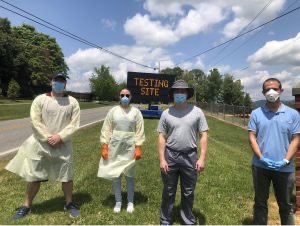UNC Eshelman School of Pharmacy’s Asheville Campus provides public health emergency, disaster planning support to Buncombe County
Faculty and students from the UNC Eshelman School of Pharmacy partnered with the Buncombe County Department of Health and Human Services to develop and test community plans to distribute drugs or vaccines during emergencies. When COVID-19 hit, this partnership was leveraged to engage pharmacy students and faculty as volunteer workers at testing and vaccination clinics operated in Buncombe County. This partnership provided the county access to specialized assistance and provided students a uniquely meaningful learning opportunity.
 In 2016, the Buncombe County Department of Health and Human Services recognized a need to improve its ability to respond to public health emergencies. In recognizing this need, the county reached out to faculty at the UNC Eshelman School of Pharmacy for help. Greene Shepherd, Pharm.D., and Stephanie Kiser, BSPharm, both faculty stationed at the school’s Asheville campus, have experience with the public health system and disaster planning, so they jumped in as subject matter experts to help develop, deliver and assess exercises for the county.
In 2016, the Buncombe County Department of Health and Human Services recognized a need to improve its ability to respond to public health emergencies. In recognizing this need, the county reached out to faculty at the UNC Eshelman School of Pharmacy for help. Greene Shepherd, Pharm.D., and Stephanie Kiser, BSPharm, both faculty stationed at the school’s Asheville campus, have experience with the public health system and disaster planning, so they jumped in as subject matter experts to help develop, deliver and assess exercises for the county.
These exercises allowed the county to practice and assess many necessary functions relating to setting up a point of distribution. These functions include important issues such as site layout, parking and traffic flow issues, communication plans, necessary staffing, just-in-time training needs, and effective workflows. These annual exercises allowed for testing plan modifications and different scenarios that allow for quality improvement. In particular, the county was able to develop best practices for preparing and administering vaccines on a large scale.
Over time, the exercises grew in size and complexity to become regional training events involving personnel from multiple counties in Western North Carolina and the North Carolina Department of Health and Human Services.
UNC Eshelman School of Pharmacy students and residents participated as both volunteer workers and victims during these exercises. On the volunteer side, students were able to test drug preparation and distribution workflows and provide valuable feedback. It also provided a great opportunity to learn about exotic diseases and allowed for collaboration with other public health professionals.
Participating as victims helped students appreciate the challenges patients may face and allowed them to consider ways to accommodate diverse needs. Before and after surveys of students that participated in these exercises indicated large increases in their confidence and likelihood for assisting in future public health emergencies. One of the main take away points for students was the importance of getting to know public health officials in communities where they work after graduation. They saw this as a key step to assisting with future public health emergencies. The school and county also entered into a formal agreement where students and faculty would be available to assist in the event of an actual public health emergency.
In 2020, COVID-19 became a reality, and the partnership took on new significance. Lessons learned from past exercises guided the county’s approach to testing and vaccine sites. Systems for communication and gathering feedback developed during the exercises allowed for continuous quality improvement to occur during the COVID response.
In the spring and summer of 2020, students and faculty were requested to support the county’s testing clinics. And in the fall of 2020, faculty and students were again engaged, this time to support pop-up influenza vaccination clinics around the county. These clinics focused on people in rural and underserved communities and were used to further guide the county’s approach for delivering COVID-19 vaccines that were being developed.
In December 2020, Buncombe County started administering COVID-19 vaccines and again pharmacy students and faculty stepped up to help. Based on student schedules for the spring semester, the school was able to support the county’s needs for preparing and administering vaccines on Fridays. Students and faculty all participated in trainings related to vaccine preparation and administration, as well as briefing every shift about changes to clinic procedures. Taking over clinic one day per week was incredibly valuable to the county because it allowed for county personnel to have much needed days off and to attend to other public health needs besides COVID-19. Students reported that participating in the county’s COVID response was an incredibly rewarding and meaningful experience for them.
Behind the Scenes Feature: Asheville students, faculty unite to provide COVID-19 testing in low-income communities
Asheville campus students and faculty go out into the community to provide free COVID-19 testing for low-income communities. Students Josh Fowler, Caroline Buckley and Aaron Roberts along with Professor Greene Shepherd have been visiting testing sites at low-income apartment complexes, schools, and housing districts to help battle healthcare disparities.
Additional stories on the UNC Eshelman School of Pharmacy’s participation in COVID-19 response in Western North Carolina:
UNC pharmacy students help Buncombe County administer COVID-19 vaccines, testing
‘Not a drill’: COVID vaccination efforts boosted by pharmacists in training
UNC Eshelman School of Pharmacy on the COVID-19 Frontlines
